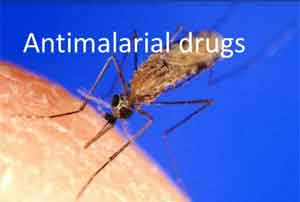- Home
- Editorial
- News
- Practice Guidelines
- Anesthesiology Guidelines
- Cancer Guidelines
- Cardiac Sciences Guidelines
- Critical Care Guidelines
- Dentistry Guidelines
- Dermatology Guidelines
- Diabetes and Endo Guidelines
- Diagnostics Guidelines
- ENT Guidelines
- Featured Practice Guidelines
- Gastroenterology Guidelines
- Geriatrics Guidelines
- Medicine Guidelines
- Nephrology Guidelines
- Neurosciences Guidelines
- Obs and Gynae Guidelines
- Ophthalmology Guidelines
- Orthopaedics Guidelines
- Paediatrics Guidelines
- Psychiatry Guidelines
- Pulmonology Guidelines
- Radiology Guidelines
- Surgery Guidelines
- Urology Guidelines
Scientists develop new compounds to combat resistant Malaria

Malaria is a global health problem caused by Plasmodium parasites that are transmitted to humans through bites from infected mosquitoes. Its incidence is increasing every year as resistance to antimalarial treatments is constantly increasing. The parasites are capable of adapting to varied environments lading to the problem of resistance.
Scientists at the Institut Pasteur and the CNRS have generated new types of DNA methylation inhibitors against malaria parasites. The quinoline–quinazoline-based inhibitors kill parasites, including artemisinin-resistant field isolates adapted to culture, in the low nanomolar range. The compounds target all stages of the asexual cycle, including early rings, during a 6 h treatment period; they reduce DNA methylation in the parasite and show in vivo activity at 10 mg/kg. These potent inhibitors are a new starting point to develop fast-acting antimalarials that could be used in combination with artemisinins. The results of their research were published in the journal ACS Central Science.
"At each stage in the cycle, epigenetic mechanisms such as histone or DNA modifications regulate the expression of the parasite's genes, enabling the specific expression of some genes in the cell at a given time so that the parasite can adapt to its environment," explains Flore Nardella, a contract researcher in the Biology of Host-Parasite Interactions laboratory (Institut Pasteur/CNRS/Inserm).
In 2019, her laboratory, led by CNRS scientist Artur Scherf, demonstrated the importance of epigenetic DNA modifications for the parasite's life cycle. The Institut Pasteur's Epigenetic Chemical Biology laboratory has unparalleled expertise in the field of DNA methyltransferase inhibitors. So it was logical for the two teams to work together to identify molecules capable of inhibiting DNA methylation and killing parasites. "Artur's team had a thorough knowledge of the epigenetic mechanisms in malaria, and we had an original chemical library with inhibitors that had already been optimized for these modifications," explains Paola B. Arimondo, a chemist, CNRS Director of Research and Head of the Epigenetic Chemical Biology Unit (Institut Pasteur/CNRS).
So the scientists decided to work on the Plasmodium falciparum parasite, especially strains of artemisinin-resistant parasites provided by the Institut Pasteur du Cambodge. In the first series of in vitro experiments, the Plasmodium falciparum parasites were allowed to interact with human red blood cells so that they could infect and develop in them. More than 70 methylation-inhibiting molecules were then tested to assess their efficacy and their specificity in relation with the parasites. "As soon as we tested the first molecules, we saw significant activity, comparable with drugs such as chloroquine," recalls Flore Nardella. "That's very rare when testing a new library of molecules." "The inhibitor molecules were very effective, and some of them killed the Plasmodium falciparum parasites in the blood in just 6 hours," adds Paola B. Arimondo.
The scientists then continued their research. In the second series of experiments, the most effective molecules were tested on resistant isolates and, once again, the results were conclusive: the molecules effectively killed the blood parasites. "This study shows, for the first time, that parasites in the blood, including artemisinin-resistant strains, can be killed rapidly by targeting DNA methylation," concludes Paola B. Arimondo. "Given the treatment failure observed in South-East Asia in particular, it is important to find new therapeutic targets. Methylation could pave the way for new drugs that, combined with artemisinin, could eliminate resistant parasites," adds Flore Nardella.
For the third stage of their work, the scientific team tested the inhibitors in vivo in mice infected with the parasite Plasmodium berghei. Once again, the approach proved successful: the treatment killed the blood parasites and the mice survived the cerebral malaria infection. The next steps for the two research teams are to continue optimizing the selectivity and efficacy of the most promising molecules (this is crucial if the molecules are to be used in humans) and to identify molecules that may act on other developmental stages of the parasites responsible for transmission.
Journal Information: ACS Central Science
For more details click on the link: DOI: 10.1021/acscentsci.9b00874

Disclaimer: This site is primarily intended for healthcare professionals. Any content/information on this website does not replace the advice of medical and/or health professionals and should not be construed as medical/diagnostic advice/endorsement or prescription. Use of this site is subject to our terms of use, privacy policy, advertisement policy. © 2020 Minerva Medical Treatment Pvt Ltd